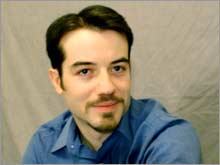 |
| Brian O'Reilly |
|
|
|
|
|
|
|
NEW YORK (CNN/Money) -
Brian O'Reilly, just 28 years old and six years out of college, already owns two businesses, is launching another, and hopes to semi-retire by age 40.
Though he maximizes his savings, investing, and shopping strategies, O'Reilly denies himself little.
"I can't see myself looking up back at age 60 and saying, 'I can't go sky diving now.'"
But one thing he won't do: overpay.
That mind-set started early. "I read about mutual funds when I was about 11," he says. "I told my parents I wanted to put my savings in one."
Those investments helped pay tuition at Johns Hopkins, where he majored in creative writing and minored in computer science. He also worked a series of jobs during college, and graduated owing very little for student loans. He worked as an IT guy for a couple of years before starting a computer consulting business setting up hardware systems and servers for small and midsize companies.
Barely a year after graduating, O'Reilly already had had it with paying rent, so he bought a three-bedroom Baltimore row house in the Hampden neighborhood and took in a couple of roommates. The house only cost $94,000.
He bought another place, practically identical to the first and just across the street, a few years later. He paid $146,000 and moved in, leaving his old roommates as tenants in the first one.
Last August, he bought a third house four blocks away. "I know what's happening in the neighborhood," he said.
O'Reilly plans to diversify out of real estate soon, though. He just doesn't believe that prices will continue their upward march much longer.
He plans to sell the first house sometime this summer, asking about $210,000. "I owe about $93,000 on it," he says, "and the profit will be tax-free because it was my primary residence for at least two of the last five years."
He rents out one of the spare bedrooms in his present residence to a roommate, a friend from school, and devotes a second bedroom to his computer business (it's a tax write-off).
Another deduction is for car expenses, at the rate of 34 cents for each mile driven for business. That helps make his Jaguar, which he bought used in December 2002, an affordable luxury. The 1995 XJ6 cost only $11,000, tens of thousands less than a new one might have cost.
Traveling man
O'Reilly also applies a sharp pencil to one of his greatest pleasures, travel. In 2003, he spent two weeks touring Europe by rail with his brother Sean. Expensive? Hardly. Sean worked for Rail Europe and got passes at a steep discount -- $200 for unlimited travel as opposed to the normal $1,500. Brian shopped for the best airfare available. He wound up spending only $280 for the flight.
"If you're willing to be flexible about the date and location," he says, " it's surprising what deals you can find."
It proved a little more difficult to find huge bargains for his 2004 excursion to Japan and Micronesia, but he still worked to get some deals. He was going to meet up with Sean (who now works in Japan) in Guam, for example. "It turned out that American Airlines had a $444 special to Japan," says O'Reilly. "So I met him there and we flew to Guam," still saving a pretty penny.
They each bought a $700 air pass that could fly them all around Micronesia. They visited places like Truk and Palau. "We're history buffs," says O'Reilly, "and we wanted to dive the World War II wrecks in Truk."
He has been to 14 different countries in the last two years, all, he claims, for very low cost.
Business plans
On the professional side, O'Reilly has done well. His income, from computer consulting and real estate, came to nearly $60,000 last year.
Accounts receivable, however, can be bumpy. "It's an unavoidable part of the business," he says. "All my clients are reliable, but some pay regularly while others wait two or three months."
That can lead to shortfalls that he bridges by tapping a home equity line of credit he's taken on his residence. That way he can pay off, for example, high-interest, credit-card bills in full, and expose himself only to the 6.5 percent APR on the HELOC, which is also tax deductible.
Now, O'Reilly and some others are starting a company to look for new technologies in such fields as 3D imaging. "It's a chance to make it big by developing and patenting ideas," he says.
He also is studying to become a certified financial planner. So many friends ask his financial advice that he figures he may as well get paid for it.
Personally, he hopes to marry and start a family in the next several years. If all goes as planned, he'll retire at age 40.
Not that he intends to idle; he'll follow his college muse and write. He particularly likes the fantasy genre. He's gained a lot of experience making his own dreams come true.
----------------------------------------
Click here to read about ways Kansan Rick Kuhlman saves on household expenses.
Robert Levine saved a bundle building his house. For his story, click here.

|